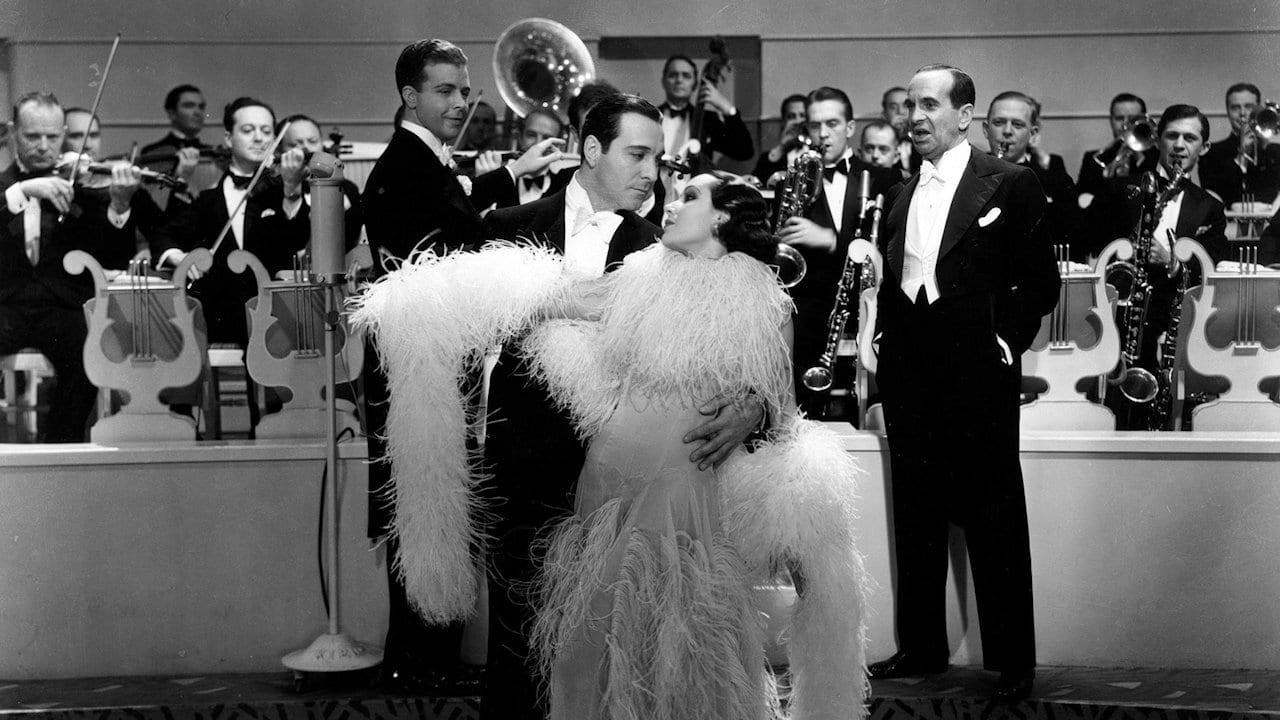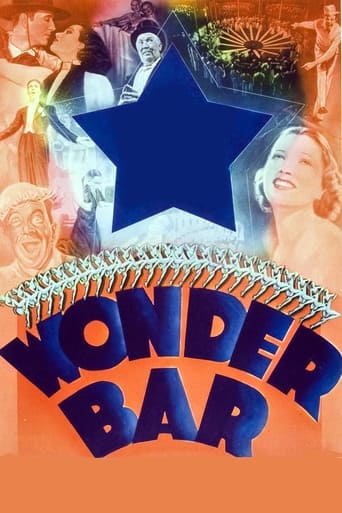

Best movie of this year hands down!
... View MoreClever, believable, and super fun to watch. It totally has replay value.
... View MoreA lot of perfectly good film show their cards early, establish a unique premise and let the audience explore a topic at a leisurely pace, without much in terms of surprise. this film is not one of those films.
... View MoreBlistering performances.
... View MoreI love "Wonder Bar." I love it in all its vulgarity and I even love the "Goin' to Heaven on a Mule" number despite Busby Berkeley's seeming determination to include virtually every ridiculous racist stereotype of Blacks. "Wonder Bar" seems to me to be one of the few Berkeley movies (like "Gold Diggers of 1933" and "Footlight Parade") whose plot is genuinely interesting and entertaining in itself and not just an excuse to set up the spectacular numbers. The alternation between drama and comedy which bothers some of the other reviewers is one of the best things about this film; it gives it a contemporary quality even if some of the numbers badly date it. Lloyd Bacon's direction is unusually stylish for this generally hacky filmmaker, the Harry Warren/Al Dubin songs are at least serviceable and sometimes better than that, and though Warners was dubious enough about Al Jolson's continued popularity that they surrounded him with an all-star cast (Dick Powell, Kay Francis, Dolores del Rio, Ricardo Cortez), he triumphs.One thing I've always loved about Jolson is that -- unlike Eddie Cantor and other contemporaries, who sang in blackface exactly the way they sang in whiteface (viz. the Cantor/Berkeley "Whoopee!") -- Jolson didn't. In his whiteface number in "Wonder Bar," "Vive la France," Jolson's voice is a shrill high tenor with an annoyingly fast vibrato. His singing on "Mule" is in an almost different style: he drops his register, slows down his vibrato, sings from deeper in his chest and genuinely tries for -- and, I think, achieves -- the simple, direct eloquence of the Black singers of the time. Whatever you think of Jolson's blackface act (and I'll admit it dates VERY badly), blackface liberated Jolson and freed him to sing in a deeper, more soulful style. One could make the case that Jolson did for Black music what Benny Goodman and Elvis Presley did later -- as a white performer he could reach audiences Blacks themselves couldn't -- and Jolson actually did it twice, in the 1910's when he got his start on Broadway and the 1940's when the success of "The Jolson Story" launched his comeback. White audiences tired of the bland "crooners" of the early 1940's seized on Jolson's direct, ballsy style, and his comeback paved the way for other Black-influenced white singers like Frankie Laine, Johnnie Ray and Elvis.Also, if you'll dig out your copy of the "O Brother, Where Art Thou?" soundtrack CD and listen to the 1928 recording of "Big Rock Candy Mountain" by Harry McClintock and you'll find that the fantasy of heaven in the "Mule" number isn't all that different from the one in this song ("where the hens lay soft-boiled eggs ... and they hung the jerk who invented work") by a whiteface performer aimed at a white audience. O.K., so no one would dare do a number like this today, but "Mule" is still astonishing and, despite the patronization, worthy to stand as the one Jolson/Berkeley collaboration.
... View MoreEntertaining musical all taking place on one evening at the swanky Paris nightclub "Wonder Bar", the film following the stories of several different characters including headline dancers Inez and Harry (aka "the gigolo"), a well-to-do woman (Kay Francis) who has paid for "dance lessons" from Harry with a diamond necklace (now being investigated by her husband and the insurance company), orchestra leader/singer Tommy (Dick Powell) who is in love with Inez, a man who spends the evening giving away all his possessions before his planned suicide of driving over a cliff, two drunken American businessmen (in "Nuts and Bolts") on vacation with their wives, a Russian Count, and at the helm of it all - Al Wonder (Al Jolson), club owner who likes to deliver rather silly one-liners as he oversees and sings sometimes too.Al loves Inez, Inez loves Harry, the two businessmen are busy chasing after two hostesses/gold-diggers, and their wives are happily pursued by another young nightclub gigolo. All of this is inter-mixed with a selection of musical numbers including a very entertaining dance number in which Harry and Inez dance surrounded by a bevy of platinum blondes and masked men, all dressed in black and white as they flow around the mirrored art deco set and dance floor, and are shown dancing in overhead, Busby Berkley-directed style kaleidoscope effect - cool! Other numbers include "The Gaucho Dance" (reminiscent of Valentino), and the big finale which is possibly the most politically incorrect, jaw-dropping musical number ever filmed featuring Al Jolson in blackface who heads to heaven complete with an entire entourage of dancing angels in blackface, "Pork Chop Orchard" where pork chops grow on trees, "Watermelon Palace" with watermelons free for the taking, "Uncle Tom To-Nite" sign, craps dice, and tap-dancing number in front of waving watermelon slices.All in all though, this film is quite enjoyable, light fare with enough stories to hold your interest, and the glitz and glamour of what appears to be a very fun-to-go-to hot spot full of well-heeled patrons in gorgeous gowns and tuxedos. I always enjoy the performances of Kay Francis and she is just fine in this, although she's not really given very much to do - same with Dick Powell, who has a small, rather bland role in this film. Guy Kibbee as one of the American businessmen and sidekick Hugh Herbert, as well as Ruth Donnelly and Louise Fazenda as the wife who likes the attentions of a younger man add quite a bit of humor to all this. Definitely worth a look.
... View MoreI am very fond of Al Jolson, But the only film I have seen with him in it is this one. I like it quite a lot but I found it very strange; what the hell was a murder story doing in a 1930's musical? Well never mind about that, just enjoy the rest of the film, with its fantastic score by Harry Warren (music) and Al Dubin (lyrics). But there is yet another thing which I wasn't particularly fond of in this film which was Dick Powell who, I think, is overrated. If you don't like minstrels then don't see this film (it has Al Jolson in it). Despite being a great lover of music, I am not terribly fond of some of Busby Berkely's stuff, His dance sequences for example, tend to be a bit over-long. Despite the handicaps that I have written here, this film is very watchable. Enjoy. 8/10
... View MoreJolson's Al Wonder is a cross between Rufus T. Firefly and an early blueprint for Bogart's Rick in CASABLANCA (he owns a club, he fixes everybody's problems, he's hopelessly in love with a woman (del Rio) who's attached to somebody else, and he's an American living in a foreign city -- Paris, in this case).Ricardo Cortez and Dolores del Rio display mannerisms typical of actors still in transition from the silent era. They both bring some magnetism to the screen, as do Kay Francis and Dick Powell. The comedy thread, featuring Guy Kibbee, Ruth Donnelly, Hugh Herbert and Louise Fazenda as two American couples determined to take advantage of the sexual exoticism of Paris, gets a little thin.It's a well made film, although clearly dated, and with some interesting moral ambiguity. Its limits as art and as entertainment are transcended during two sublime Busby Berkeley sequences: the first a typically dazzling choreographic gem emerging from a Cortez/del Rio dance routine; and the second, equally impressive, but bizarre, following Jolson in blackface going up to Heaven on a mule, during which Jolson seems to want to add Cab Calloway to his character's identikit.It's to Lloyd Bacon's (and the cast's) credit that the contrivances of the plot don't dull the film's impact too much, but it is only when BB's magic unfolds that WONDER BAR becomes exceptionally good.
... View More